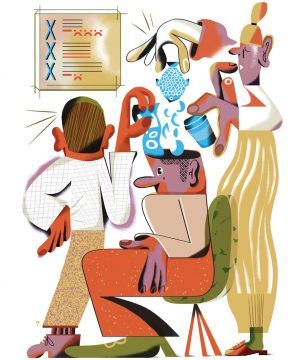Tom Chivers in Nature:
 Three years ago, a team of psychologists challenged 180 students with a spatial puzzle. The students could ask for a hint if they got stuck. But before the test, the researchers introduced some subtle interventions to see whether these would have any effect. The psychologists split the volunteers into three groups, each of which had to unscramble some words before doing the puzzle. One group was the control, another sat next to a pile of play money and the third was shown scrambled sentences that contained words relating to money. The study, published this June1, was a careful repeat of a widely cited 2006 experiment2. The original had found that merely giving students subtle reminders of money made them work harder: in this case, they spent longer on the puzzle before asking for help. That work was one among scores of laboratory studies which argued that tiny subconscious cues can have drastic effects on our behaviour. Known by the loosely defined terms ‘social priming’ or ‘behavioural priming’, these studies include reports that people primed with ‘money’ are more selfish2; that those primed with words related to professors do better on quizzes3; and even that people exposed to something that literally smells fishy are more likely to be suspicious of others4. The most recent replication effort1, however, led by psychologist Doug Rohrer at the University of South Florida in Tampa, found that students primed with ‘money’ behave no differently on the puzzle task from the controls.
Three years ago, a team of psychologists challenged 180 students with a spatial puzzle. The students could ask for a hint if they got stuck. But before the test, the researchers introduced some subtle interventions to see whether these would have any effect. The psychologists split the volunteers into three groups, each of which had to unscramble some words before doing the puzzle. One group was the control, another sat next to a pile of play money and the third was shown scrambled sentences that contained words relating to money. The study, published this June1, was a careful repeat of a widely cited 2006 experiment2. The original had found that merely giving students subtle reminders of money made them work harder: in this case, they spent longer on the puzzle before asking for help. That work was one among scores of laboratory studies which argued that tiny subconscious cues can have drastic effects on our behaviour. Known by the loosely defined terms ‘social priming’ or ‘behavioural priming’, these studies include reports that people primed with ‘money’ are more selfish2; that those primed with words related to professors do better on quizzes3; and even that people exposed to something that literally smells fishy are more likely to be suspicious of others4. The most recent replication effort1, however, led by psychologist Doug Rohrer at the University of South Florida in Tampa, found that students primed with ‘money’ behave no differently on the puzzle task from the controls.
It is one of dozens of failures to verify earlier social-priming findings. Many researchers say they now see social priming not so much as a way to sway people’s unconscious behaviour, but as an object lesson in how shaky statistical methods fooled scientists into publishing irreproducible results. This is not the only area of research to be dented by science’s ‘replication crisis’. Failed replication attempts have cast doubt on findings in areas from cancer biology to economics. But so many findings in social priming have been disputed that some say the field is close to being entirely discredited.
More here.
